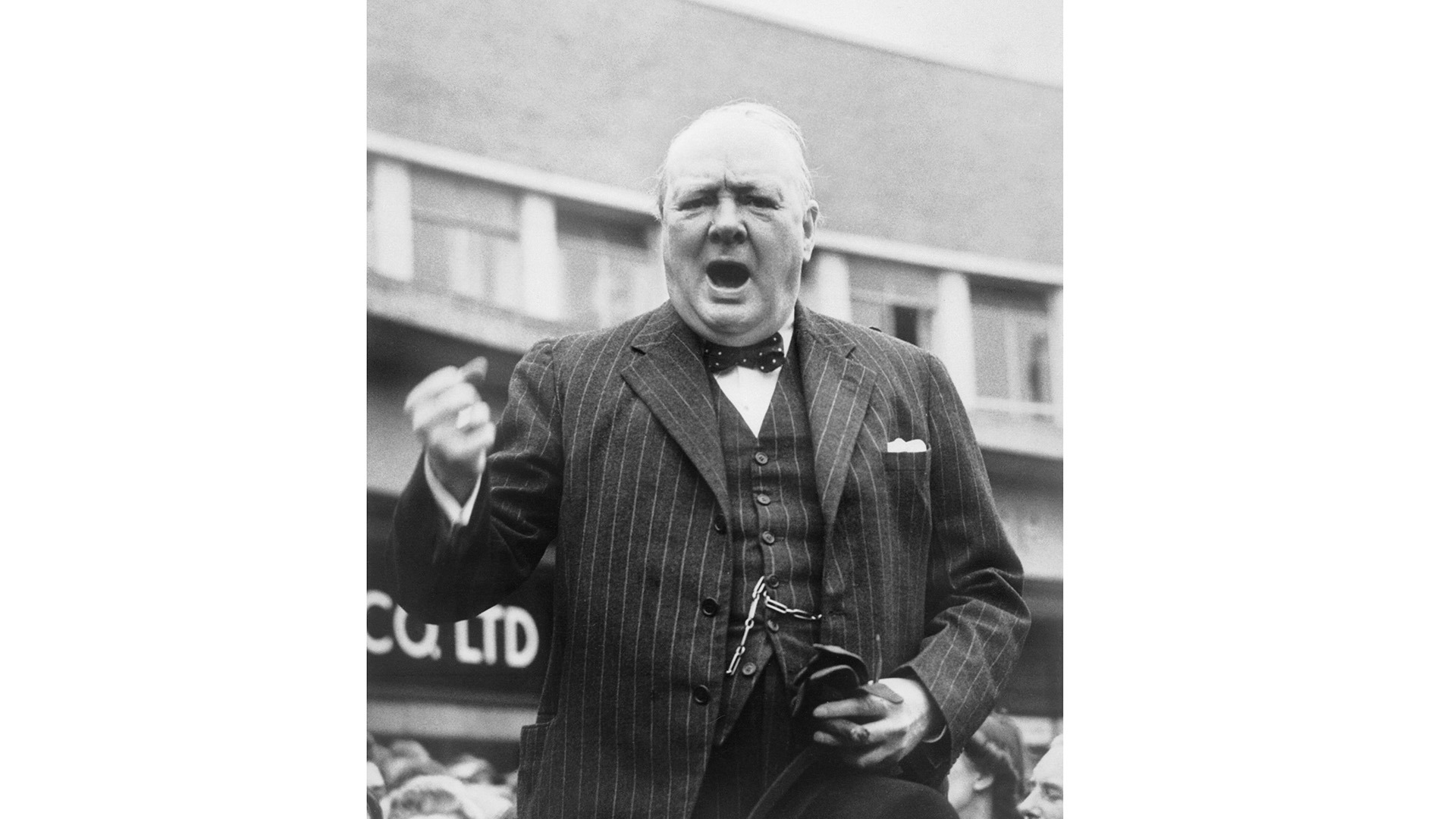I think about Winston Churchill a lot. A successful writer, correspondent, painter, politician and businessman, he is known for his bold principled stand against Hitler. However, zoom in and a more complex narrative emerges.
After Neville Chamberlain negotiated the Munich Agreement in 1938, which sought to appease Nazi Germany by allowing them to take control of the Sudetenland region of Czechoslovakia, Winston Churchill famously said, “You were given the choice between war and dishonor. You chose dishonor, and you will have war.”
They look wise now, but his comments were unwelcome. Many people in Britain and other countries believed that the agreement would prevent war and that Churchill’s warnings were alarmist. He was even removed from his position as First Lord of the Admiralty in 1939 and was not given any major government positions until 1940 when he became Prime Minister as the war had already started.
He pushed through years of criticism and personally rallied a nation with his bold, counter-cultural, stand that led the allied powers to victory. If we stopped there, we have a tight schoolbook story of leader who did the right thing and was vindicated and honored.
Unfortunately for Sir Winston, shortly after the war, his government was defeated in the general election of July 1945. The British people were tired after six years of war and preferred the Labour Party’s program of social reforms. He found himself doubted, vindicated and then cast away.
Everyone and every organization wants integrity, but actually having it, keeping it and acting on it is a challenge. Nothing is simple when you find yourself at a different place than those around you. Holding a counter-cultural view means going against the dominant beliefs and values of the system you are working hard to support.
Yes, integrity can be dangerous. The word integrity doesn’t have meaning and power when everyone agrees. When integrity forces you to be different, it’s dangerous for you and others. You risk losing your friends, your job and your sleep.
Counter-cultural integrity threatens the status quo and big organizations need broad buy in to the status quo to get things done. The right thing may be good in the long run, but it can be disruptive now. Personal integrity requires standards that may not change with culture or a corporation’s strategy for risk mitigation. Anyone who holds to an independent set of standards will eventually find themselves a problem in a rigid and ever changing system.

Worst of all, the road towards acting on integrity brings you into contact with the dark side. There is a temptation to be right and feel superior to the system you are in. You need the inspiration of the examples of Martin Luther King, Gandhi, Winston Churchill or Abraham Lincoln, but you can’t conflate your situation and your strength with theirs. You have to remain humble while not losing your convictions. You have to be continually open to being wrong. You have to push yourself to be flexible. You have to see and respect the other side.
The other temptation is to give in to self-pity and think that the world is against you. The professional world can be a dark, amoral, and heartless place. That is reality–true everywhere. No one is a unique and constant victim of unjustified persecution or mistreatment. There is no conspiracy, just people trying to make it all work and not lose their status, jobs or relationships.
The stress of finding yourself alone, against the crowd, is real. The only way to survive it is to have a trusted network of friends– not friends who just listen, affirm and agree, but friends who hold you accountable and clarify your thoughts. A good friend turns a dark and lonely road into conviction that can confirm your individuality and authenticity. Most important, sharing your story can lead to positive change. There is no tighter community than like-minded individuals who support, refine, and validate each other’s perspectives.
I’ve taken several counter-cultural stands in my life with a wide range of outcomes. All were painful. Every stand I’ve taken has resulted in some degree of lost friendships and increased pain. Some day I may be proud of these actions, but all of them resulted in a lost opportunity where I had to get off the boat and watch it sail on. If there is any pride in that, it’s drowned out by the sadness of it all.
I’ve learned that I’m not particularly brave or strong. However, I’m blessed with great community, a love of history and a deep care for others. Most of all, I feel convicted to protect others who trust and depend on me doing the right thing.
But this isn’t the movies. As I’ve post-processed tough stands, when I did the most good, I felt the worst inside. Taking a different road leaves you feeling alone and scared, self-conscious and unsure. Integrity put into practice in these scenarios makes part of you wish you didn’t have it. It’s not fun and it doesn’t feel courageous. When I’ve done the most right, the overwhelming emotion is sadness and insecurity.
Here I’m convicted and encouraged by two father son chats. The first is Polonius, who is giving advice in Hamlet to his son Laertes as he prepares to leave for France. Polonius urges his son to be honest with himself, to be true to his own values and beliefs, and to avoid the temptations and pitfalls of the world. He advises Laertes to “neither a borrower nor a lender be” and to “this above all: to thine own self be true, And it must follow, as the night the day, Thou canst not then be false to any man.” If Laertes is true to himself, he will not be able to deceive others; he will be true to himself and avoid compromise for the sake of others or for the sake of fitting in.
The second is from Cicero. He wrote to his son, Marcus, that an unjust act will never profit him.
Stop. Just let the gravity of this settle. This may be the most counter-cultural message ever written. A thief can at least enjoy his spoils a little bit, right? A boss who complies with pressure to promote a lesser qualified person at the expense of her/his better judgment may get a promotion that helps their career, right?
No, Cicero says it won’t help them. He believed in an absolute view of morality and integrity. He wrote that an unjust act is not only morally wrong, but it will also ultimately harm the person who commits it and the society that allows it. He believed that living a virtuous life and making the right choices, even if difficult, is the only true path to true happiness and fulfillment. In his letter Ad Familiares Cicero wrote: “There is nothing more virtuous, nothing more in accord with duty, than to take one’s stand for what is right.” He also wrote in this same letter:
“What is morally right is not always politically expedient; and what is politically expedient is not always morally right.”
Cicero believed that true success and happiness come from living a virtuous life, and that this requires standing up for what is right, even when it may be difficult or unpopular. Even when it looks like an easy compromise, it will never profit you. Never. Even if you are lucky and some good results from your actions, you have harmed your soul.
The wisdom of history, a deep personal faith and a tight network of friends all give me confidence to do the right thing, no matter the cost. This is true even with full knowledge of just how dangerous, costly and lonely the road of counter-cultural integrity is.
I’m jealous of those who can compromise, make things work and steer situations to a middle ground, but I have trouble here. This isn’t a brave or honorable as much as I see no other option. Without deep reflection on, and a commitment to hold to standards, I wouldn’t have individuality or authenticity.
Just as breathing is a necessary function for survival, holding to one’s standards and integrity is necessary for maintaining a sense of self and personal agency. Without it, one risks becoming a mere follower or conforming to the beliefs and values of others, losing their unique perspective and individuality. Holding to one’s standards and integrity can be challenging–it’s been the hardest thing I’ve had to do–but it is a fundamental aspect of being true to oneself.
It’s fitting to have just passed Martin Luther King day. MLK wrote:
“The ultimate measure of a man is not where he stands in moments of comfort and convenience, but where he stands at times of challenge and controversy.”
Character is revealed not in moments of ease, but in times of adversity, and when difficult choices and decisions are made. This quote reminds me that true strength and honor come from standing up for what is right, even when it is hard and uncomfortable, and that we should strive to be true to our principles and values, even in the face of opposition. All power is moral power and all strength requires the willingness to walk the hard road, even when it isn’t where you want to go.

Smooth seas do not make great sailors. It’s the weak Betas that stay in the harbor their entire life, to scared to live life. In fact when you find life going to easy, a man must purposefully introduce new challenges and obstacles into their own path. One must find pleasure in the journey. The “end” does not exist until you are dead. In regards to feeling like shit when you do what’s right, there is a saying. If you want to be a strong man. Get used to being hated by weak men.
Tim, I deeply enjoyed this post. It is hard and the modern corporate environment is definitely challenging. I appreciate your candor and willingness to share your thoughts.
It is tough. I hope defense is a place of high integrity and a place where there is space for high integrity. Few industries have the criticality that you would have now. I’m glad you are there and hope your hard stands are all related to prior work and not your current job. Always glad to enjoy your wisdom.
Tim – As someone who self-assesses as having very strong core values, this resonated well. My only qualifier would be that if everyone who is in a position to make a difference approached problems solely through their principled views, then we end up with situations such as the United States Legislative branch where no one is able to compromise and solutions are not developed to address the needs of the people. So yes, hold on to your core values and use your virtues as a north star to make decisions, but also keep your eyes open and be willing to collaborate on a solution that meets 90% of your goal.
This is a great post Tim. I know here you say it isn’t “brave” or “honorable” but standing firm in your morals, core beliefs, and integrity in today’s environment regardless of it being a popular position or not is definitely a brave action — especially knowing the consequences of that stance. I appreciate you opening up about this and writing something that I feel like a lot of leaders need to hear and embrace.
Tim – a great read and gives some insights into your character. I do wonder what definition of integrity you are using.
1. firm adherence to a code of especially moral or artistic values (Merriam-Webster)
2. the quality or state of being complete or undivided (Merriam-Webster)
Number one is based on values, and those are different for everybody (normative).
Number two is a more defined answer on what integrity is (positive) and can be empirically tested.